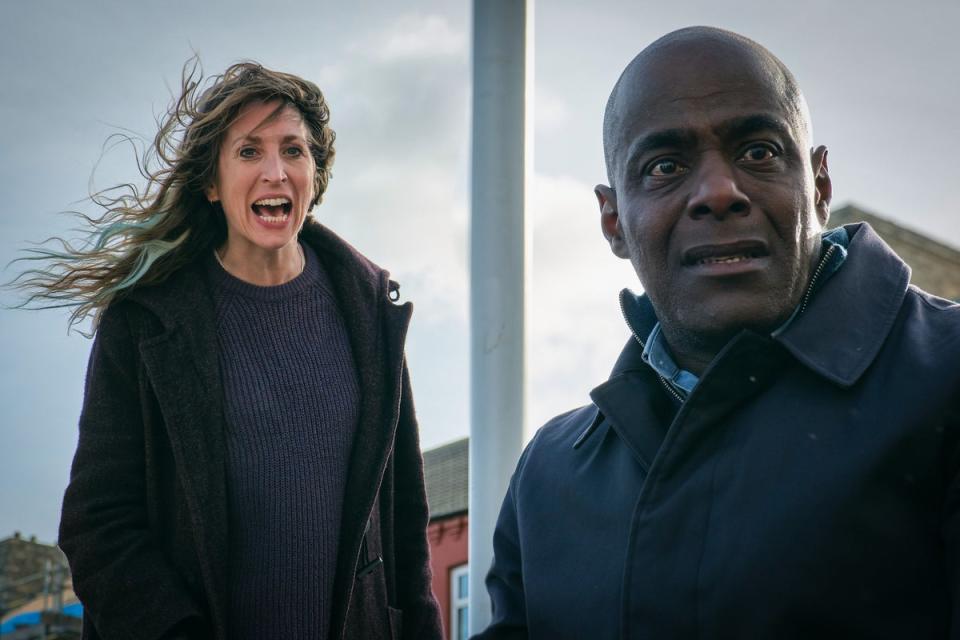Boat Story review: BBC’s pitch-black comedy falls short of its Coen Brothers ambitions
Crime doesn’t pay. We’re taught that adage in a number of ways, not least in the litany of films that show crime, in all its splendour, not paying. But what about the inadvertent criminals? The ones who stumble upon an unexpected bounty? From Millions and Whisky Galore! to No Country for Old Men and Shallow Grave, audiences love to see ordinary people caught up in extraordinary stories. And the people don’t come much more ordinary, or the stories much more extraordinary, than those on display in the BBC’s new six-part thriller Boat Story.
In an Ayrshire town (so quaint it “makes Peterborough look like Portugal”), under the shadow of a power station, lives Janet (Daisy Haggard) who recently lost several fingers in an industrial accident. “My life is one big Groundhog Day of waking up under a f***ing lawnmower and being torn to shit,” she observes ruefully. Her unending disappointment, however, is interrupted one morning on a dog walk when she encounters Samuel (Paterson Joseph) and, together, they discover a boat full of cocaine – and dead bodies. Rather than turn the scene in to the police, they take the drugs to a lock-up and embark on a series of adventures that can only be described as shenanigans.
These involve running away from a psychopathic French kingpin known only as The Tailor (Tchéky Karyo), a bumbling PC (Ethan Lawrence) and his randy mother (Joanna Scanlon), plus an assortment of other underworld eccentrics. The tone is slippery – “This is a story about a boat,” declares the wry narration of Ólafur Darri Ólafsson – existing somewhere between farce and thriller. Janet and Samuel are an odd-couple pairing – she is a down-on-her-luck charmer; he is a City slicker with a gambling problem – but one that is rooted in real lives and their real problems. “We’re not Thelma and Louise, you daft bastard!” Janet yells at her accidental partner when he gets carried away.
Haggard is a terrific presence as Janet, a woman always on the cusp of cynicism without ever quite arriving there. The sweetness of her central relationship with Samuel, though, is balanced out by violence that goes far further than most farces. Masked gunmen shoot up a police station, shotgun cartridges tear holes in the chests of half a dozen coppers, and a tongue is graphically extracted from the mouth of a squealing prisoner. For many, it will be enough violence to make them switch the channel. If Boat Story owes a debt of gratitude, then it is to cinema directors like the Coen Brothers, Quentin Tarantino, and Martin McDonagh. Humour mixed with a blackness colour-matched from the darkest recesses of the universe.
The series is a strange match for BBC One, which usually peddles in far more emotional intimacy. Here, the characterisation is wafer-thin. Evil is rendered in cartoonish colours, while the less morally repugnant characters are uniformly motivated by desperation rather than avarice. Over a two-hour film – think Rian Johnson’s The Brothers Bloom, Shane Black’s Kiss Kiss Bang Bang, or Curtis Hanson’s LA Confidential – this absence of psychological profundity is tolerable, but over six hour-long episodes, the relentlessly quippy, playful tone becomes grating. Meta comedy can be an effective tool – look at Arrested Development, or even Good Omens, which is a tonal sibling of Boat Story – but excesses of self-reference can be destructive. It’s what killed The Simpsons.

Creators Harry and Jack Williams, whose previous series include Angela Black and The Tourist, have undoubtedly had fun with the story. And it’s good to see a show set in the north of England that isn’t misery porn. Boat Story zips along like a Rube Goldberg machine, filled with twists and turns and unexpected revelations, rarely doubling back for any real introspection. Yet while it has many of the hallmarks of comedy, both in its generic conventions and in dialogue that is tricksy and droll, Boat Story is rarely funny. And that leaves it feeling, at times, like a knock-off of a Coen Brothers film rather than the real deal.
All the same, it’s good to see a show as formally experimental as Boat Story getting a primetime slot. The desire to privilege watchability over gravitas is all too rare in British telly, and ought to be applauded. But Boat Story is too ambitious, too inconsistent, and too insincere; in the end, not unlike a beached craft loaded with both expensive drugs and murdered corpses, it’s never more than a mixed bag.


